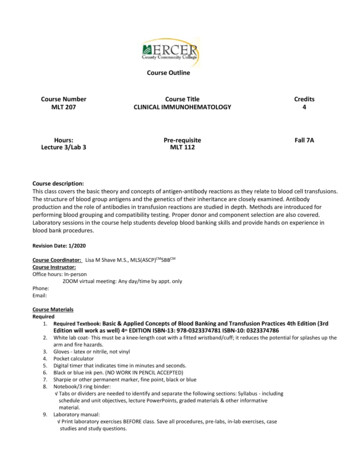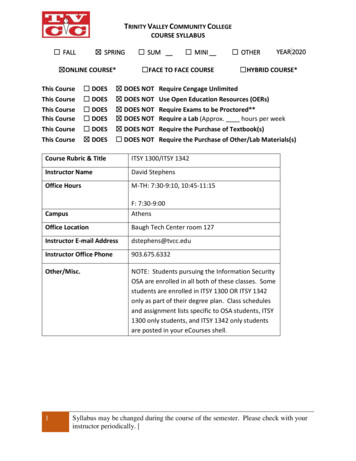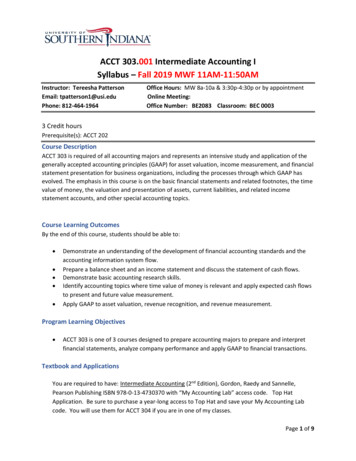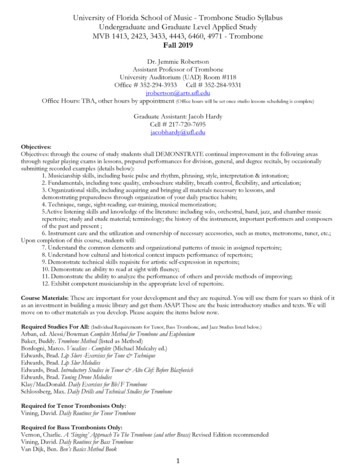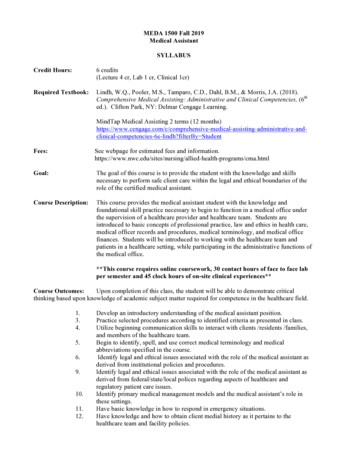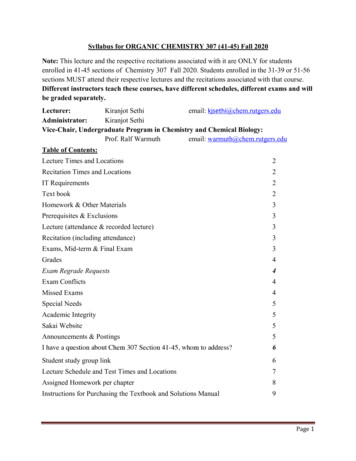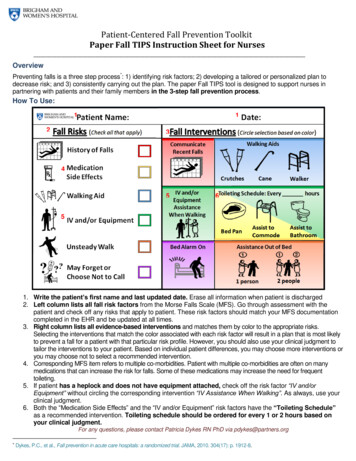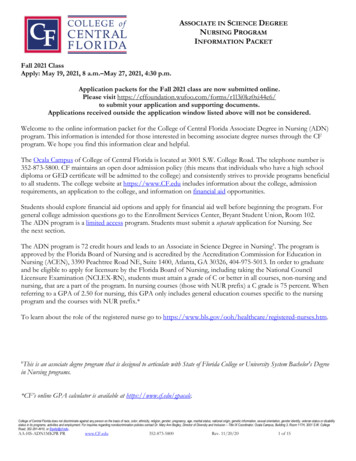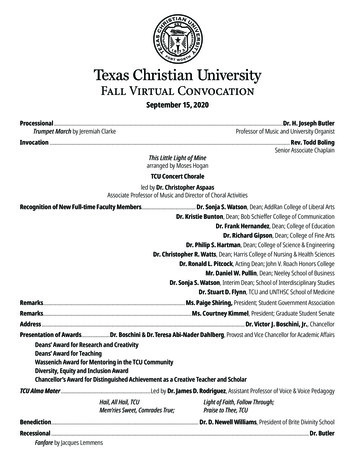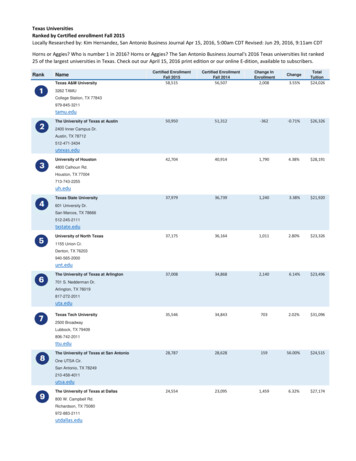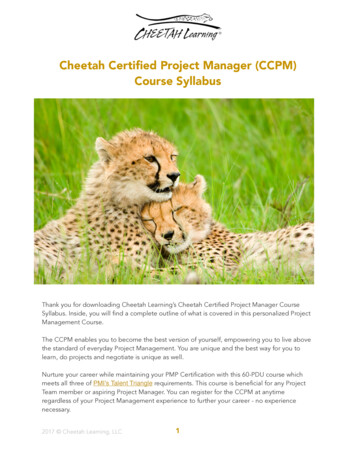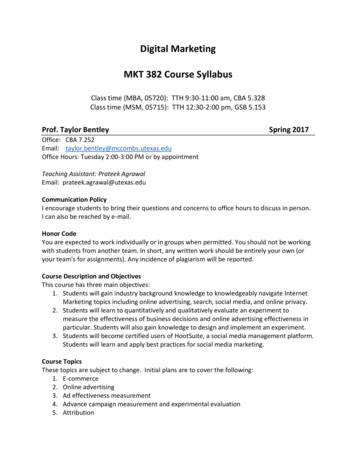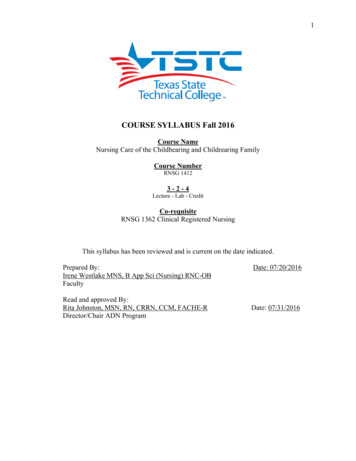
Transcription
1COURSE SYLLABUS Fall 2016Course NameNursing Care of the Childbearing and Childrearing FamilyCourse NumberRNSG 14123-2-4Lecture - Lab - CreditCo-requisiteRNSG 1362 Clinical Registered NursingThis syllabus has been reviewed and is current on the date indicated.Prepared By:Irene Westlake MNS, B App Sci (Nursing) RNC-OBFacultyRead and approved By:Rita Johnston, MSN, RN, CRRN, CCM, FACHE-RDirector/Chair ADN ProgramDate: 07/20/2016Date: 07/31/2016
RNSG 1412Nursing Care of Childbearing and Childrearing FamiliesCourse SyllabusI.Page 2Instructor InformationNameIrene WestlakeContact Information254-522-5203PositionFacultyII.Class Times, LocationOnline with clinical dates and times to be scheduledIII.Course Description & IntroductionOffice HoursBy AppointmentA.WECM/ACGM Course Description: Study of concepts related to the provision ofnursing care for childbearing and childrearing families. Application of systematicproblem-solving processes and critical thinking skills, including a focus on thechildbearing family during the perinatal periods and the childrearing family frombirth to adolescence, and competency in knowledge, judgment, skill, andprofessional values within a legal/ethical framework.B.WECM/ACGM End-of-Course Outcomes: Examines the roles of the professionalnurse in the perinatal and pediatric settings; utilize a systematic problem-solvingapproach and critical thinking skills when providing nursing care for thechildbearing and childrearing family.C.Principles and concepts of health promotion, complete patient assessment,analysis of data, critical thinking in the nursing process, team participation, andtreatment modalities related to the nursing care of clients and their families.D.Graduates are able to use therapeutic communication in the patient setting.E.Successful graduates utilize critical thinking skills and a systematic problemsolving process as a framework for providing care to clients and familiesexperiencing health problems.F.Graduates have acquired skills enabling them to explain the roles of theprofessional nurse in caring for clients and families in the childbearing andchildrearing stages of life dealing with experiencing health issues and diseases.
RNSG 1412Nursing Care of Childbearing and Childrearing FamiliesCourse SyllabusPage 3IV.Learning Outcomes based on the Texas Board of Nursing DECsA.As a Member of the Profession, the student will: Effectively demonstrate the legal and ethical guidelines of the nursingprofession, agency policy, school policy, and Nurse Practice Act Maintain acceptable and workable relationships with colleagues and peers Integrate accountability and responsibility for actions and quality nursing careinto professional practice Analyze own critical and analytical thinking in decision making process Evaluate behaviors that support advocacy for clients Evaluate nursing advocacy in various health care interactions Function within the nurse’s legal scope of practice and in accordance with thepolicies and procedures of the employing health care institution or practicesetting. Assume responsibility and accountability for the quality of nursing care providedto patients and their families. Participate in activities that promote the development and practice of professionalnursing. Demonstrate responsibility for continued competence in nursing practice, anddevelop insight through reflection, self-analysis, self-care, and lifelong learning.B.As a Provider of Patient-Centered Care, the student will: Critically evaluate situations from different perspectives to develop an in depthcomprehensive assessment for multiple clients with predictable or unpredictablehealth care needs Incorporate critical thinking approach to analyze assessment data and selectappropriate nursing diagnosis for assigned patients Function as a member of the interdisciplinary team by demonstrating clinicalskills, with minimal supervision, in caring for multiple clients with chronicpredictable or unpredictable health care needs Demonstrate nursing actions to meet client needs while maintaining clientdignity and rights Coordinate care for multiple clients using time management and costcontainment principles
RNSG 1412Nursing Care of Childbearing and Childrearing FamiliesCourse Syllabus C.Page 4Anticipate, report, and document clients’ responses to medications,treatments, and proceduresEvaluate interventions within legal and ethical parameters as determined bythe Texas Board of Nursing – Nurse Practice ActUse current technology to gather evidence based information in clinicaldecision-making in nursing actionsIntegrate valid research in planning care for clients with chronic health careneeds.Demonstrate principles of nursing leadership including delegation, timemanagement, and conflict resolution.Use clinical reasoning and knowledge based on the diploma or associate degreenursing program of study and evidence-based practice outcomes as a basis fordecision making in nursing practice.Determine the physical and mental health status, needs, and preferences ofculturally, ethnically, and socially diverse patients and their families based uponinterpretation of comprehensive health assessment findings compared withevidence-based health data derived from the diploma or associate degree nursingprogram of study.Analyze assessment data to identify problems, formulate goals/ outcomes, anddevelop plans of care for patients and their families using information fromevidence-based practice in collaboration with patients, their families, and theinterdisciplinary health care team.Provide safe, compassionate, comprehensive nursing care to patients and theirfamilies through a broad array of health care services.Implement the plan of care for patients and their families within legal, ethical, andregulatory parameters and in consideration of disease prevention, wellness, andpromotion of healthy lifestyles.Evaluate and report patient outcomes and responses to therapeutic interventions incomparison to benchmarks from evidence-based practice, and plan follow-upnursing care.Develop, implement, and evaluate teaching plans for patients and their families toaddress health promotion, maintenance, and restoration.Coordinate human, information, and materiel resources in providing care forpatients and their families.As a Patient Safety Advocate, the student will:
RNSG 1412Nursing Care of Childbearing and Childrearing FamiliesCourse Syllabus D.Page 5Demonstrate knowledge of the Texas Nursing Practice Act and the Texas Boardof Nursing Rules that emphasize safety, as well as all federal, state, and localgovernment and accreditation organization safety requirements and standards.Implements nursing procedures safely, accurately, and within legal and ethicalparameters, including scope of practiceUtilize critical thinking skills to make safe and ethical clinical decisions.Implement measures to promote quality and a safe environment for patients, self,and others.Formulate goals and outcomes using evidence-based data to reduce patient risks.Obtain instruction, supervision, or training as needed when implementing nursingprocedures or practices.Comply with mandatory reporting requirements of the Texas Nursing PracticeAct.Accept and make assignments and delegate tasks that take into considerationpatient safety and organizational policy.As a Member of the Health Care Team, the student will: Collaborate with other health care providers and clients and their families toprovide care and education for clients with complex health care needs withconsideration of developmental needs Collaborate in multidisciplinary planning to provide care for clients/families withcomplex health care needs Apply therapeutic communication skills with diverse clients and families havingcomplex health care needs Coordinate, collaborate, and communicate with patients, their families, and theinterdisciplinary health care team to plan, deliver, and evaluate patient-centeredcare. Serve as a health care advocate in monitoring and promoting quality and access tohealth care for patients and their families. Refer patients and their families to resources that facilitate continuity of care;health promotion, maintenance, and restoration; and ensure confidentiality. Communicate and collaborate in a timely manner with members of theinterdisciplinary health care team to promote and maintain optimal health statusof patients and their families. Communicate and manage information using technology to support decisionmaking to improve patient care.
RNSG 1412Nursing Care of Childbearing and Childrearing FamiliesCourse Syllabus E.Page 6Assign and/ or delegate nursing care to other members of the health care teambased upon an analysis of patient or unit need.Supervise nursing care provided by others for whom the nurse is responsible byusing evidence-based nursing practice.Explain the nurse’s role in preventing, reducing the risk, diagnosis, teaching,formulating a nursing care plan, and management of patients/familiesexperiencing high risk pregnancy complications.Describe nursing management of a trial of labor, the induction and augmentationof labor, forceps- and vacuum-assisted birth, cesarean birth, and vaginal birthafter a cesarean birthDescribe assessment of infants for birth trauma and for sequelae of a diabeticpregnancy, pregnancy with suspected fetal infectionDefine the assessment and care of a newborn and distinguish among the effects ofalcohol, heroin, methadone, marijuana, cocaine, and smoking on the fetus andnewbornDescribe the pathophysiology, diagnostic studies and clinical manifestations,assessment data, patient/family education of increased intracranial pressure,Down’s syndrome in the newborn, Meniere’s syndrome, Trigeminal neuralgia,cerebral vascular disease, and cerebral aneurysm, and traumatic head injuriesDifferentiate between the pathophysiology, diagnostic studies, clinicalmanifestations, assessment data, and patient/family education related tohydrocephalus in children and adults, seizures, AIDS neurological complications,lead poisoning, and tumors of the brain21st Century Skills Set/Essential Competencies – the student will: Solve problems and building employability skills such as listening, attitude,critical thinking, adaptability and work ethic. Use critical thinking skills to complete assignments correctly and on time. Exhibit professional principles to perform skills on time within due dates. Use adaptability skills to complete assignments and perform skills in a timelymanner along with other course work. Use listening skills to complete assignments correctly as per requirements. Exhibit a positive attitude in completing class work on time and correctly. Exhibit professional principles by coming to class on time and calling in asrequired when absent.Use critical thinking skills to identify methods, requirements, and standards to enhance and develop vocational nursing practice.
RNSG 1412Nursing Care of Childbearing and Childrearing FamiliesCourse SyllabusPage 7Students may vary in their competency levels on these abilities. As a student, you canexpect to acquire these abilities as you honor all course policies, attend classesregularly, complete all assigned work in good faith and on time, and meet all othercourse expectations described.V.Assessment Methods & Grading PolicyTeaching Methodologies:Online Lecture methods/Group InteractionsLabs/Hands on Demonstration/Team ActivitiesVideoOnline Learning EnvironmentsOnline resourcesQuizzesSimulationExaminationsAll assignments are expected to be turned in on time to designated area (Assignmentdropbox). Any work turned in after the designated date/time will be late and will notbe accepted without prior written approval from the instructor. Assignment deadlineis at the discretion of the instructor not to exceed 24 hours. An assignment that is notaccepted due to failure to meet the designated time/date will result in a “Zero” forthat coursework. NO EXCEPTIONS. The LVN to RN Program is a fast-pacednursing program and failure to meet deadlines can result in failure of the course.The course grade is determined by unit tests, final exam, and weekly assignments. Allweekly assignments in Moodle, course point or ATI must be complete in full toreceive points The weighted grading will be as follows:15% ATI Assignments70 % unit and final exams15% Prep U Assignments1. You must achieve an unweighted exam average of 80% onproctored exams in order to sit for final exam.2. You must achieve an unweighted exam average of 80% on all
RNSG 1412Nursing Care of Childbearing and Childrearing FamiliesCourse SyllabusPage 8proctored exams including the final exam to pass the course.3. You must have a cumulative course average of 80% to pass thecourse.Letter grades assigned to final course averages for all nursing courses are:The student must pass this course with a “B” or better, and the accompanyingclinical course for the appropriate level with a grade of “B” or better to progress inthe LVN-RN Program.90.00-100 A80.00-89.99 B70.00-79.99 C60.00-69.99 DBELOW 60 FEXAM/TESTING PROCEDURES The examinations will be on dates as designated in the scheduleStudents will take all exams on scheduled class days with a TSTC faculty/staff present inthe classrooms.Each unit exam is 30 - 50 questions with a maximum test time of 1.5 minutes perquestion.The final exams may be up to 100 questions with a maximum of 2 ½ hours to completethe final exam—THERE WILL BE NO EXTENSIONS ON THE TEST TIMES unlessindicated through ADA exemption paperwork.All exams are completed in Moodle, course point, or ATI.Exams may include multiple choice, or SATA (select all that apply); No extra creditquestions are included, test scores are NOT rounded.Each student is expected to take exams on the days and times they are scheduled. Ifstudent misses an exam, the student will be expected to make contact with the instructorprior to the exam and make arrangements within 24 hours for a make-up exam. The examgiven may not be the same version the class was given and may be presented in analternate format, at the instructor’s discretion. Make-up exams must occur within oneweek of initial exam date or exam score will result in a “zero”. Students with make-upexams may not exceed score of 85.
RNSG 1412Nursing Care of Childbearing and Childrearing FamiliesCourse SyllabusPage 9Upon testing, know your log in, bring, a pencil and calculator. Do NOT bring books,notes, electronic devices, purses etc. into the test area. You will be provided with scratchpaper. There will be a scheduled test review by faculty for each unit examination. Theinstructor has up to 72 hours to post exam results in the Moodle classroom. If thereare problems and grades cannot be posted in the allotted time frame an email will besent through Moodle informing students. This allows time to review the exam results. If you have concerns about your grade, youmust contact the instructor within 1 week of the exam to arrange a time to meet with,and discuss your concerns. When the week following the test is over the topic of theweek’s exam will not be revisited.ONLY ONE ( 1 ) MAKE‐UP EXAM PER COURSE IS ALLOWED AND THE MAXMIUM GRADE YOUMAY MAKE IS 85%. IF YOU MISS FURTHER EXAMS YOU WILL RECEIVE A ZERO ( O ). FINAL GRADES ARE NOT ROUNDED AND NO EXTRA CREDIT IS GIVEN ON ANYASSIGNMENT OR EXAM.WEEKLY ASSIGNMENTS.Throughout the course there will be various online synchronous and asynchronousactivities for students to participate in or complete to enhance the learning of the contentand application of concepts. Each student is expected to participate in a timely manner.Any work turned in after the designated date/time will be late and will not be acceptedwithout prior written approval from the instructor. An assignment that is not accepteddue to failure to meet the designated time/date will result in a “Zero” for thatcoursework.Any Simulation activities will require a completion score of 100% on both the actualsimulation and the post test.Please note: All written work is expected to be turned in on time. Any work turnedin after the designated date will be late and no points will be received or clinicalhours will be deducted accordingly. All written/typewritten work must be legiblewith correct spelling and grammar and must be written in APA format asapplicable. Student name must be included on each assignment submitted. Although
RNSG 1412Nursing Care of Childbearing and Childrearing FamiliesCourse SyllabusPage 10some assignments won’t receive an actual ‘letter/number’ grade, their assignedratings will be part of the evaluation process for weekly, mid-term and finalevaluations. Review plagiarism and copyright guidelines prior to writing anyassigned paper. Papers may be submitted to Turnitin plagiarism checker.Throughout the course there will be various online synchronous and asynchronousactivities for students to participate in or complete to enhance the learning of the contentand application of concepts. Each student is expected to participate in a timely manner,failure to submit assignments by the due date will result in zero for the assignment.TIPS TO ENSURE TIMELY SUBMISSIONSA student should always “CC” himself/herself on an email, this will send a copy of theemail back to the student who originated it, (and whomever you have sent it to) so that itverifies that it was sent. Follow up all submissions whether electronic or via facsimilethat are of concern with an email request or phone call for verification. This helps ensurethe student does not receive a zero if there is a technology issue.VI.Textbook/Reference MaterialsAssessment Technologies Institute. (2016). Content mastery series: Reviewmodule RN maternal newborn nursing (10th ed.). AuthorLippincott The Point. (2014). DocuCare. Retrieved fromhttp://thepoint.lww.comRicci, S. S., Kyle,T., & Carman, S. (2014). Lippincott coursepoint formaternity and pediatric nursing (5th ed.). Philadephia,PA: Wolters-Kluwer.Ricci, S. S., Kyle, T., & Carman, S. (2014). Maternity and pediatricnursing (2nd ed.) Philadelphia, PA: Wolters-Kluwer.VII.Additional Resources & SuppliesLibrary Database:
RNSG 1412Nursing Care of Childbearing and Childrearing FamiliesCourse SyllabusPage 11All students have access and will be expected to retrieve their evidence based articlesfrom the TSTC Nursing Database.The textbooks listed above are primary sources for the student. However, in order for thelearner to achieve mastery of particular nursing principles and skills, the faculty may useand/or recommend additional materials. The student has the responsibility to utilize thismaterial for optimum development. Students are encouraged to explore all additionallearning resources, including the Internet, which can be accessed in the computerlab/library. Laptop/Computer Access Internet Access (High Speed recommended)VIII. Class Participation Policy & Student ConductREMEDIATION AND STUDENT ACTION PLANSStudent action plans are communication tools used within the TSTC nursing programs forvarious reasons. These documents serve as a communication method for remediation,absenteeism, status in course, and disciplinary issues. Therefore, these documents shouldnot be necessarily viewed as a “negative” focus unless it is of discipline in nature. Thesetools help identify areas of concern and/or weakness with a plan or action to assist thestudent to remediation on such issues.A student action plan that is labeled “Unprofessional Conduct” is disciplinary and isreserved for offenses as identified by the Texas Board of Nursing, Nurse Practice Acts, orwithin the standards of nursing that constitutes a serious concern or offense. A studentwritten up on Unprofessional Conduct more than once (two times) will be dismissed fromthe program. See excerpt from student handbook below:Per LVN-RN Student Handbook:Any student a receiving formal counsel designated and states “UNPROFESSIONALCONDUCT” on a Student
the LVN-RN Program. 90.00-100 A 80.00-89.99 B 70.00-79.99 C 60.00-69.99 D BELOW 60 F EXAM/TESTING PROCEDURES The examinations will be on dates as designated in the schedule Students will take all exams on scheduled class days with a
